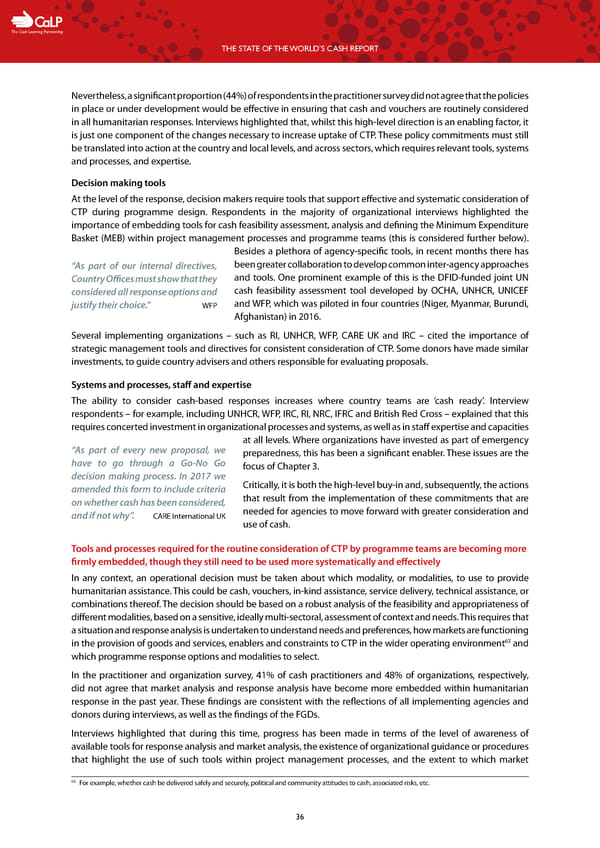C The Cash Learning Partnership THE STATE OF THE WORLD’S CASH REPORT Nevertheless, a significant proportion (44%) of respondents in the practitioner survey did not agree that the policies in place or under development would be effective in ensuring that cash and vouchers are routinely considered in all humanitarian responses. Interviews highlighted that, whilst this high-level direction is an enabling factor, it is just one component of the changes necessary to increase uptake of CTP. These policy commitments must still be translated into action at the country and local levels, and across sectors, which requires relevant tools, systems and processes, and expertise. Decision making tools At the level of the response, decision makers require tools that support effective and systematic consideration of CTP during programme design. Respondents in the majority of organizational interviews highlighted the importance of embedding tools for cash feasibility assessment, analysis and defining the Minimum Expenditure Basket (MEB) within project management processes and programme teams (this is considered further below). Besides a plethora of agency-specific tools, in recent months there has “As part of our internal directives, been greater collaboration to develop common inter-agency approaches Country Offices must show that they and tools. One prominent example of this is the DFID-funded joint UN considered all response options and cash feasibility assessment tool developed by OCHA, UNHCR, UNICEF justify their choice.” WFP and WFP, which was piloted in four countries (Niger, Myanmar, Burundi, Afghanistan) in 2016. Several implementing organizations – such as RI, UNHCR, WFP, CARE UK and IRC – cited the importance of strategic management tools and directives for consistent consideration of CTP. Some donors have made similar investments, to guide country advisers and others responsible for evaluating proposals. Systems and processes, staff and expertise The ability to consider cash-based responses increases where country teams are ‘cash ready’. Interview respondents – for example, including UNHCR, WFP, IRC, RI, NRC, IFRC and British Red Cross – explained that this requires concerted investment in organizational processes and systems, as well as in staff expertise and capacities at all levels. Where organizations have invested as part of emergency “As part of every new proposal, we preparedness, this has been a significant enabler. These issues are the have to go through a Go-No Go focus of Chapter 3. decision making process. In 2017 we Critically, it is both the high-level buy-in and, subsequently, the actions amended this form to include criteria that result from the implementation of these commitments that are on whether cash has been considered, needed for agencies to move forward with greater consideration and and if not why”. CARE International UK use of cash. Tools and processes required for the routine consideration of CTP by programme teams are becoming more firmly embedded, though they still need to be used more systematically and effectively In any context, an operational decision must be taken about which modality, or modalities, to use to provide humanitarian assistance. This could be cash, vouchers, in-kind assistance, service delivery, technical assistance, or combinations thereof. The decision should be based on a robust analysis of the feasibility and appropriateness of different modalities, based on a sensitive, ideally multi-sectoral, assessment of context and needs. This requires that a situation and response analysis is undertaken to understand needs and preferences, how markets are functioning 63 in the provision of goods and services, enablers and constraints to CTP in the wider operating environment and which programme response options and modalities to select. In the practitioner and organization survey, 41% of cash practitioners and 48% of organizations, respectively, did not agree that market analysis and response analysis have become more embedded within humanitarian response in the past year. These findings are consistent with the reflections of all implementing agencies and donors during interviews, as well as the findings of the FGDs. Interviews highlighted that during this time, progress has been made in terms of the level of awareness of available tools for response analysis and market analysis, the existence of organizational guidance or procedures that highlight the use of such tools within project management processes, and the extent to which market 63 For example, whether cash be delivered safely and securely, political and community attitudes to cash, associated risks, etc. 36
 The State of the World's Cash | Full Report Page 37 Page 39
The State of the World's Cash | Full Report Page 37 Page 39